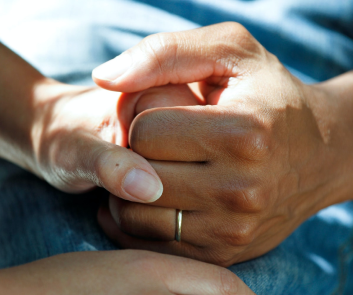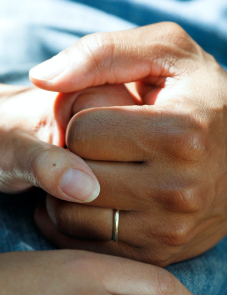Life Ledger’s series of conversations with the people and organisations that are shaping today’s bereavement sector, continues with Colette Scarbrough-Jelfs, Head of Operations and Partnerships at Widowed and Young, WAY just ahead of their 25th anniversary.
LL: Tell us a little bit about your background and how you came to find yourself in the bereavement sector?
CSJ: After the death of my husband in 2012, I struggled for a long time to find support aimed at younger widows. At the age of 33, although I was surrounded by friends and family who loved and supported me, I felt very alone and isolated.
I searched locally and nationally for support for myself and my children. After a while, I found WAY Widowed and Young and began to find other people who had also been widowed before their 51st birthday. Through the peer-to-peer support offered by the charity, I was able to reach out and engage with people and gain immediate support, understanding and friendship. Before long, I was volunteering for the charity by organising events.
In June 2016, myself and another WAY member ran a weekend away over Father’s Day for 60 people. There were tears and laughter and I watched as great friendships were created. Knowing the positive impact the charity had on my life, I jumped at the chance to work full time for the charity when the opportunity arose. In January 2017, I took on the role of Membership Services Manager.
Over the years, I have worked closely with the Board and WAY members and have watched as the membership has increased by 73% from the beginning of 2017 to over 4,250 members at the end of 2021. As the charity has grown, so has my role. In early 2022, I took on the role of Head of Operations and Partnerships for WAY. I work closely with the Chief Executive to increase the reach of the charity with a view to making sure that anyone who has been widowed at a young age in the UK is aware that we are here.
LL: How did WAY Widowed and Young start?
CSJ: WAY was launched in 1997 by Caroline Sarll, who had looked for a bereavement support group for her widowed sister and had been unable to find one. In a restaurant in Cardiff on 26 February 1997, the first WAY meeting took place. That was how the WAY Foundation, which we now know as WAY Widowed and Young, first came into existence.
In the early days, there was a small but incredibly dedicated team of volunteers who soon decided that they wanted to provide support further afield and began travelling to Manchester, Birmingham, London and beyond to set up WAY groups throughout England, Scotland, Wales and Northern Ireland.

LL: What is the main aim of WAY Widowed and Young?
CSJ: WAY Widowed and Young has two main aims, to advance the education of the public to raise the awareness of the needs of people who and widowed and young and to relieve persons in need, following bereavement by offering a peer-to-peer support network for anyone aged 50 or under, at time of bereavement, who is overcoming the loss of a partner, married or not, with or without children, inclusive of sexual orientation.
LL: What have been the biggest challenges faced by WAY Widowed and Young to date?
CSJ: The last two years have been incredibly challenging both for the charity and for WAY members, who have faced enforced isolation and heightened fears surrounding day to day life. The pandemic led to a rise in new members reaching out for support. As well as people who had been newly bereaved, we also noticed that people were joining who had been bereaved for many years but needed additional support through the pandemic. As a charity with a very small team, we worked flat out – from home – to support every person who reached out to us.
The shift from face-to-face meet ups to online events was challenging – both for members and the Operations Team. But everyone pulled together and we found new innovative ways to continue the growth of the charity.
LL: What do you feel have been WAY Widowed and Young’s biggest successes to date?
CSJ: As a charity, we have had so many successes but underlying each of these have always been our members and our volunteers, who donate their time to support other members.
Each of our members has been through bereavement and understands how difficult it can be. WAY is a member led charity and we continue to grow because our members empower and support each other to get through each minute of each day.
LL: Where would you ideally like to see WAY Widowed and Young in ten years’ time?
CSJ: WAY currently supports over 4,200 people, but we estimate there are around 100,000 people across the UK who would be eligible to join our charity. Ideally, we want to continue to grow as a charity and extend our reach so that those who become eligible in the future know we are there to offer friendship, support and understanding.
LL: What do you feel is the single biggest issue currently facing the death/bereavement sector?
CSJ: Although everyone will face bereavement at some point in their lives, death has been one of the biggest taboos in our society, which has meant that the bereavement sector has struggled to get the recognition it deserves. Over the last few years, during the pandemic, people have started to talk more openly about death and dying, which has helped to break down many of the stigmas we have faced as a sector. As we move forward, I hope that these conversations continue to flow and that death and bereavement can be acknowledged and discussed more openly so that those who have been bereaved, regardless of their age or circumstances, can find the support they need and deserve.
LL: Which other organisation/s or people really impress you in the death/bereavement sector?
CSJ: We work closely with many charities across the country, as each of our members have experienced very different types of bereavement and we want to ensure they get all the support they can. The work of Suicide Bereavement UK highlights the importance of supporting those who have bereaved by suicide, which has been so beneficial to so many people who struggle following a suicide bereavement. Also, Winston’s Wish and other child bereavement charities including Child Bereavement UK and Grief Encounter, work hard to support children after the death of a parent or sibling, as well as offering support in schools to educate people about bereavement. The work of charities like these is invaluable for so many of our members.



